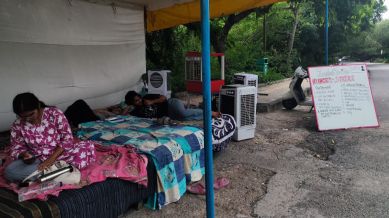Stay updated with the latest - Click here to follow us on Instagram
Hunger strike by JNUSU enters 12th day
The Jawaharlal Nehru University Students’ Union (JNUSU) has strongly rejected an undertaking issued by the JNU administration to students seeking continued hostel access beyond their original deadlines for PhD completion.

Members of the elected student union at Jawaharlal Nehru University (JNU) on Tuesday entered the 12th day of a hunger strike demanding automatic extension of hostel accommodation rights for research scholars who have received academic extensions to complete their PhDs.
The Jawaharlal Nehru University Students’ Union (JNUSU) has strongly rejected an undertaking issued by the JNU administration to students seeking continued hostel access beyond their original deadlines for PhD completion.
monthly limit of free stories.
with an Express account.
The protest, which drew several students to the Sabarmati T-point on campus, took a grim turn on Monday night when JNUSU president Nitish Kumar was hospitalised with chest pain. The union has alleged many protestors are facing deteriorating health conditions.
At the heart of the stand-off is an undertaking issued by the Dean of Students on July 7, which required students seeking hostel extension to declare their PhD submission date and acknowledge that such extensions are granted only “on humanitarian grounds subject to the availability of hostel accommodation on a case-to-case basis”.
The JNUSU has dismissed the format as “patronising” and “tone-deaf”. “It seems the template has been taken off from the JNU V-C’s (vice-chancellor) favourite ‘maafiveer’ Savarkar’s mercy petition,” the union stated in a statement issued on Monday.
“The V-C must know that JNU students will not bow down to such ill-thought undertakings,” it added.
The statement, signed by Nitish Kumar, JNUSU vice president Manisha, and general secretary Munteha Fatima, spoke of growing concern over how the policy “disproportionately” affected women, students from marginalised communities, and persons with disabilities.
“Do you have an iota of understanding about how many women students will have to leave their PhD… after continuously fighting a battle within their families to be able to study?” the statement asks V-C Santishree Dhulipudi Pandit. “How will PwD (Persons with Disabilities) students be able to continue research without the necessary infrastructure, which is possible only because of their access to hostels,” it asked.
According to JNUSU, the undertaking disregarded the material realities of research scholars, especially those who are not (National Eligibility Test) NET-qualified and receive a meager Rs 8,000 monthly stipend. “No one is aware of the things that might happen during fieldwork, which might cause delay,” the statement said, arguing that timelines for PhD submission are not always within students’ control.
In their July 7 meeting with the Dean, the JNUSU had demanded that academic extension should by default translate to the extension of hostel accommodation rights. The JNU’s refusal to guarantee this has triggered fears of forced dropouts, particularly among scholars from financially disadvantaged backgrounds, the union claimed.